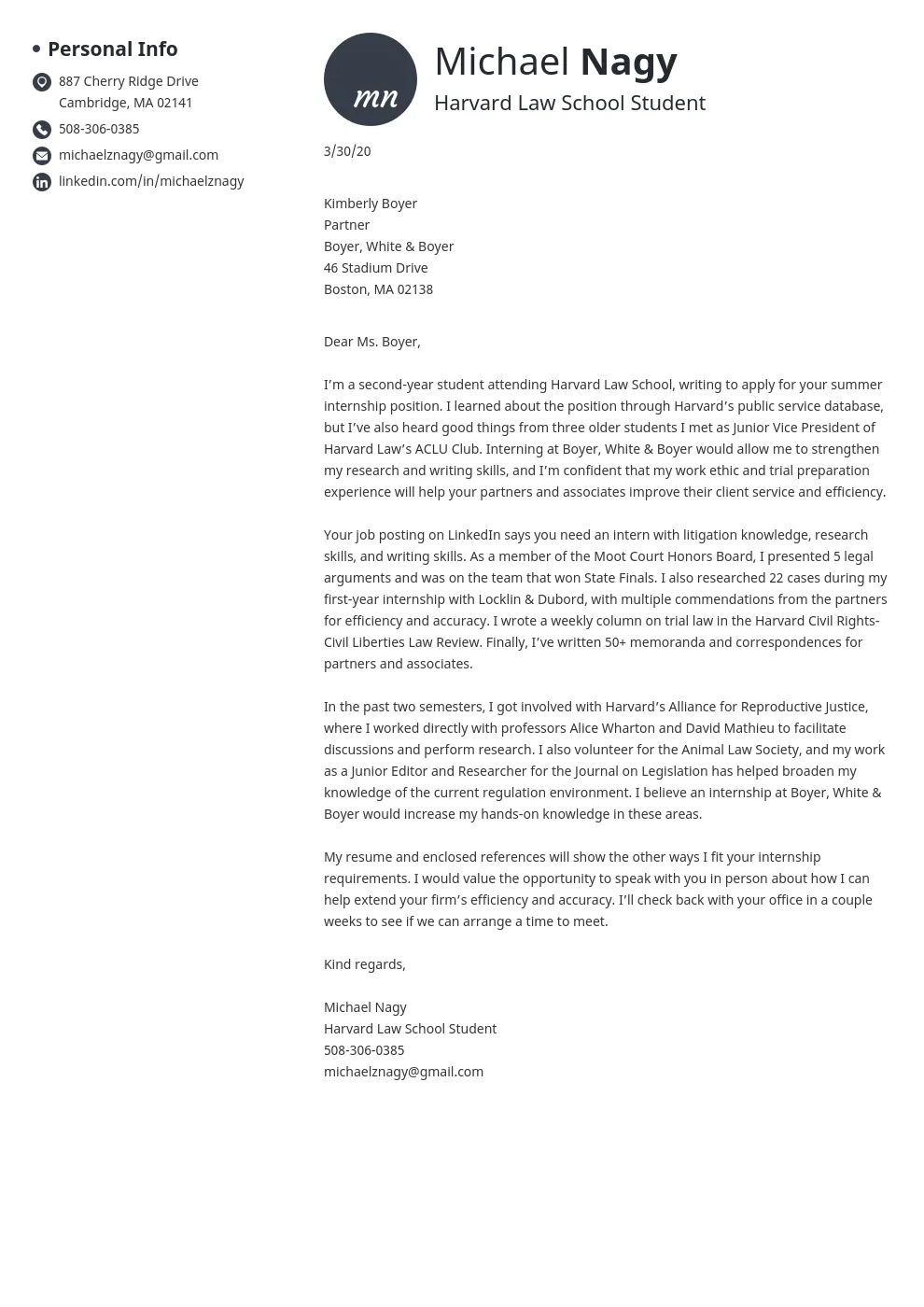Understanding the Importance of a Law Firm Cover Letter
A cover letter is more than just a formality; it’s your first opportunity to make a strong impression on a law firm. In the competitive legal field, a well-crafted cover letter can set you apart from other applicants and significantly increase your chances of landing an interview. It’s your chance to introduce yourself, highlight your relevant skills and experiences, and articulate your enthusiasm for the firm and the legal profession. A cover letter offers a space to showcase your personality, writing skills, and genuine interest in the specific firm, which a resume alone cannot always convey. Ignoring this crucial document means you are missing out on a prime chance to make yourself more competitive in the hiring process. A compelling cover letter can transform your job application from good to great.
Key Components of a Law Firm Cover Letter
A strong law firm cover letter follows a standard structure but is tailored to demonstrate your specific qualifications and interest. The letter typically begins with your contact information, the date, and the law firm’s contact details. It should open with a professional salutation, such as “Dear Mr./Ms. [Last Name]” if you know the hiring manager’s name, or “Dear Hiring Manager” if you don’t. The body of the letter includes a clear statement of your purpose, highlighting your skills and experience relevant to the specific job and the firm’s needs. Conclude with a strong closing, expressing your interest in the opportunity and a call to action, such as requesting an interview. Always proofread carefully and ensure your letter is formatted professionally, using a readable font and appropriate margins.
Contact Information and Salutation
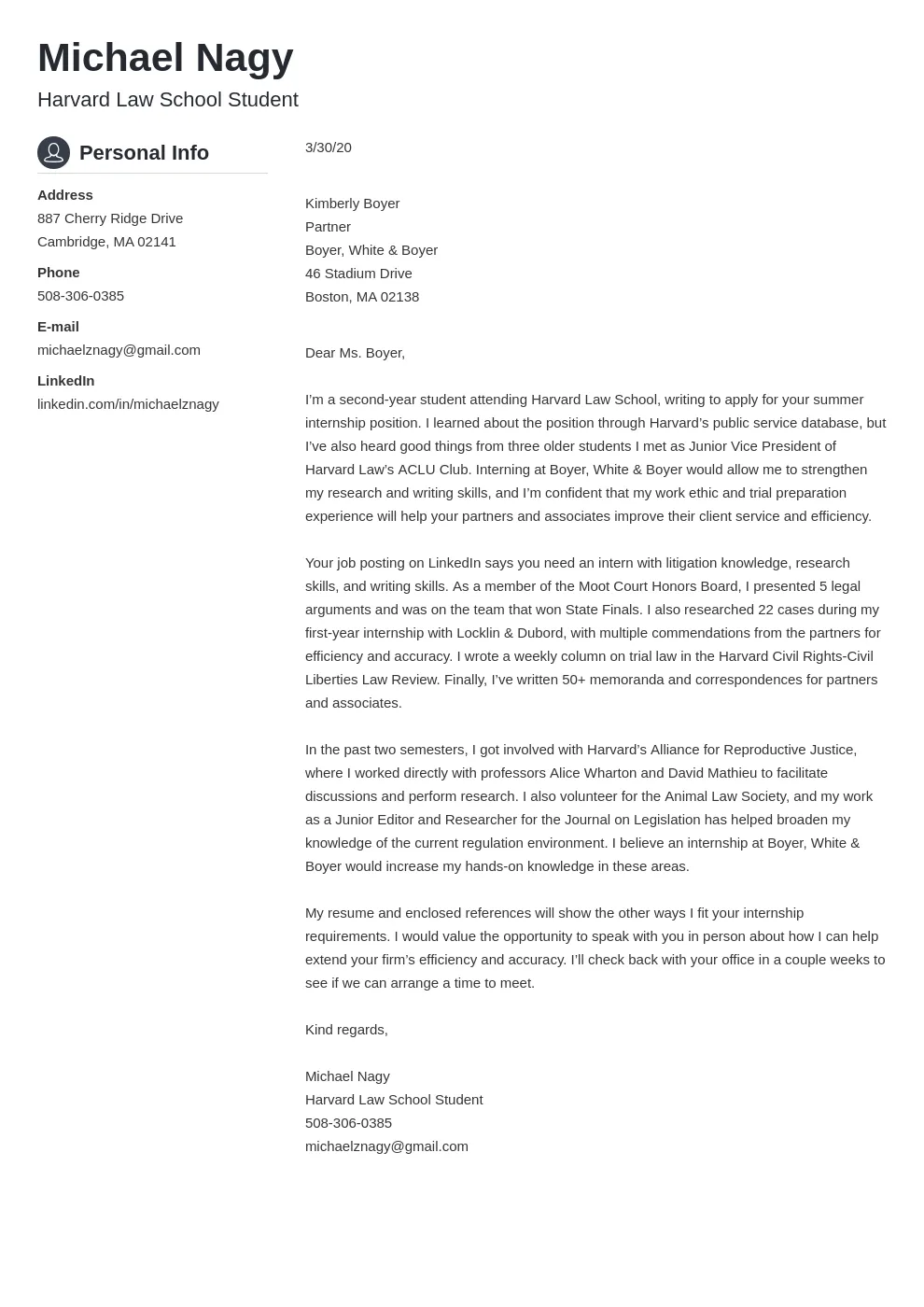
Begin your cover letter by providing your full contact information at the top, including your name, address, phone number, and professional email address. Following this, include the date, and then the law firm’s contact details, including the hiring manager’s name and title, if available. The salutation sets the tone for the entire letter; thus, it’s essential to address it correctly. If you know the hiring manager’s name, using “Dear Mr./Ms. [Last Name]” is best. Otherwise, use a general salutation like “Dear Hiring Manager”. Always double-check the spelling of the recipient’s name and the law firm’s name. A personalized salutation shows that you have taken the time to research the firm and its people. Correct formatting in this section establishes credibility and attention to detail.
Tailoring Your Cover Letter for a Law Firm
Customization is crucial in a law firm cover letter. Generic letters are easily identified and often discarded. Tailor your letter to each specific law firm and the position you are applying for. Research the firm’s values, culture, recent cases, and areas of expertise. Demonstrate that you understand the firm’s work and how your skills and experience align with its needs. Mention specific attorneys or partners whose work you admire. By showing a genuine interest in the firm, you immediately make yourself more appealing than an applicant who has sent out a generic application to multiple firms. Mention specific aspects of the firm that resonate with you; it could be the firm’s commitment to pro bono work, its work in a particular area of law, or its approach to client service. This level of specificity demonstrates genuine interest and research.
Highlighting Your Skills and Experience
Your cover letter should highlight your skills and experiences most relevant to the legal position. Instead of simply restating your resume, elaborate on the skills you’ve gained and how you’ve applied them. Use specific examples to illustrate your abilities. If you have experience in legal research, detail the types of research you have conducted and the outcomes. If you have strong writing skills, provide instances where you’ve drafted legal documents or persuasive arguments. Include any awards or recognitions you’ve received, and quantify your achievements wherever possible. Always emphasize how your skills and experience directly benefit the law firm. Use keywords from the job description to help your application pass through applicant tracking systems (ATS).
Showcasing Relevant Legal Skills
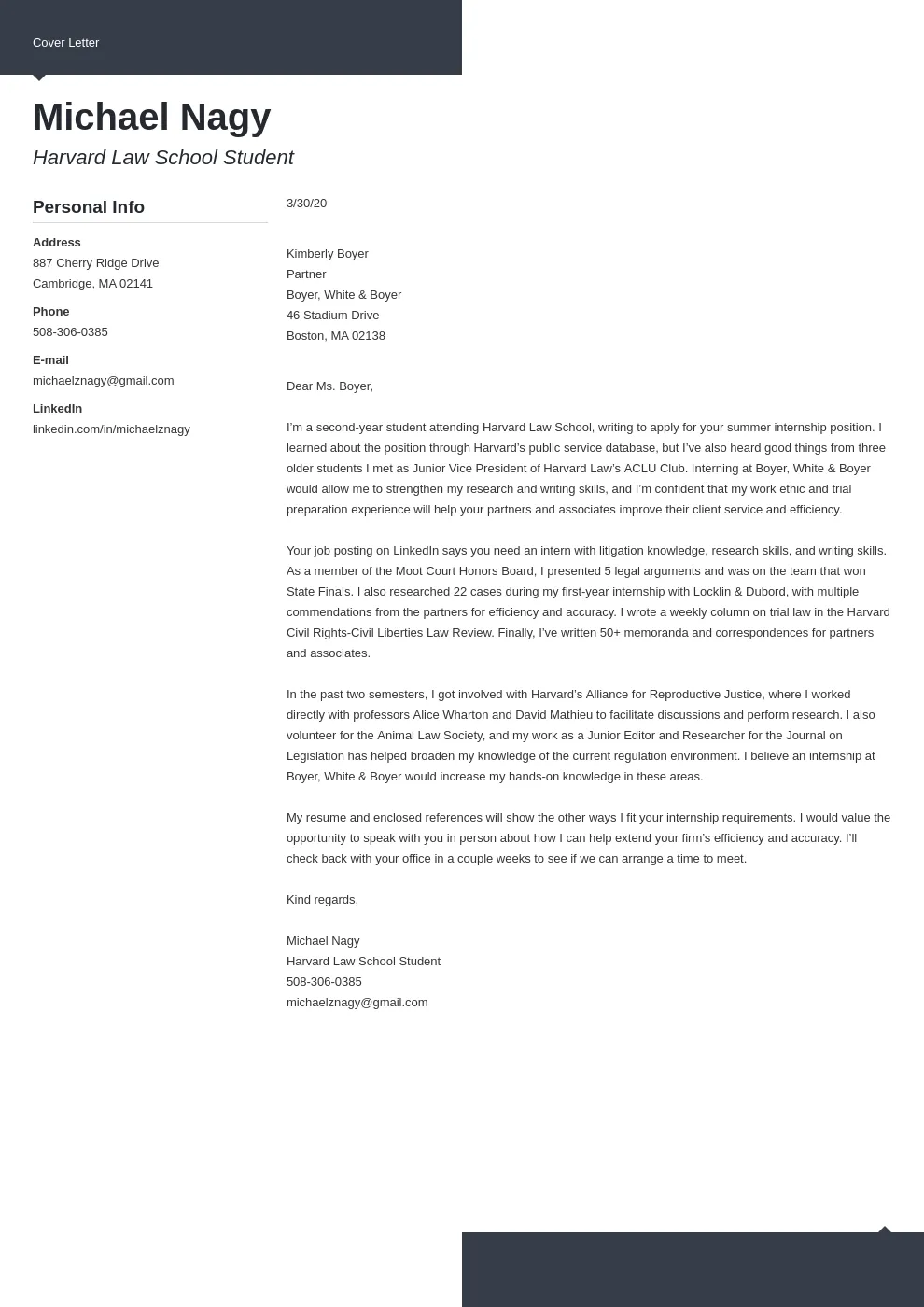
Focus on legal-specific skills in your cover letter. These may include legal research, legal writing, analytical thinking, negotiation, and communication. If you have experience with specific legal software or databases, mention those. Include details about your experience with case management, litigation support, or client interaction. Always link your skills to the job requirements and provide specific examples of how you have used those skills successfully in the past. For example, if you’re highlighting your legal research skills, you might describe how you efficiently used Westlaw or LexisNexis to find critical precedents and analyze case law. This specific detail shows competence and readiness to contribute to the firm’s work.
Quantifying Achievements with Data
Whenever possible, quantify your achievements using data to demonstrate your impact. For example, instead of saying you improved efficiency, state that you reduced processing time by 15%. If you helped a team to successfully resolve a legal dispute, note the specific outcomes achieved, such as monetary settlements or favorable judgments. When describing your writing skills, mention the number of documents you drafted or the success rate of your briefs. Quantifiable results make your accomplishments more impactful and provide objective evidence of your abilities. Using data helps in measuring your effectiveness and demonstrates your potential value to the law firm. Consider using metrics to showcase how your actions led to concrete benefits.
Demonstrating Your Passion for Law
Conveying your passion for law is essential in a cover letter. Explain why you chose a career in law and what motivates you. Share your enthusiasm for the legal profession and your commitment to excellence. Discuss specific areas of law that interest you, and mention relevant coursework, projects, or experiences that have fueled your interest. If you’ve volunteered or interned at a law firm or legal aid organization, describe these experiences in detail. By sharing your enthusiasm, you demonstrate that you are genuinely interested in pursuing a legal career and are not just seeking a job. This emotional connection can make you more memorable to the hiring manager. It shows that you are not just qualified but also excited about the potential role.
Why You Chose This Law Firm
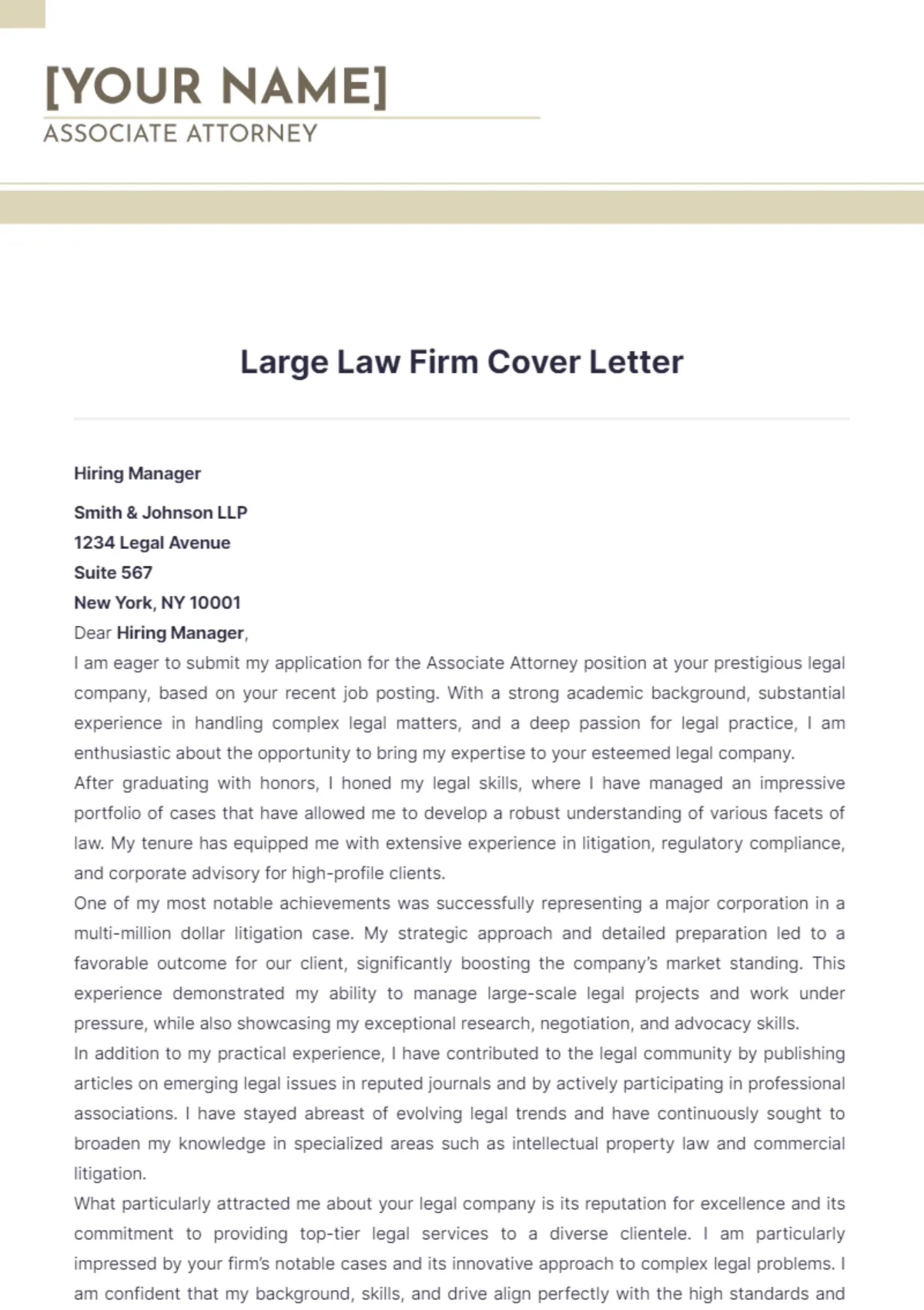
Explain why you chose to apply to this particular law firm in your cover letter. Show that you have done your research and understand the firm’s values, practice areas, and reputation. Mention specific aspects of the firm that resonate with you. For example, you might admire their dedication to pro bono work, their innovative approach to client service, or their success in a particular area of law. Demonstrate how your career goals align with the firm’s mission and culture. Mentioning specific attorneys or cases the firm has handled can further illustrate your knowledge and interest. Expressing your genuine interest in the firm demonstrates that you are looking for more than just a job. It’s about finding the right fit.
Expressing Your Career Goals
Clearly state your career goals and how the position aligns with them. Explain what you hope to achieve in this role and how you see yourself contributing to the firm’s success. Be specific about your long-term career aspirations and how this opportunity will help you reach those goals. Are you hoping to become a specialist in a specific area of law, or do you seek a leadership position within the firm? By expressing your career goals, you are showing that you have a plan and a clear understanding of your professional development. It also helps the hiring manager to assess whether your aspirations align with the firm’s opportunities. Alignment between your goals and the firm’s values creates a mutually beneficial relationship.
Crafting a Compelling Closing
Your closing should be strong and leave a lasting positive impression. Reiterate your interest in the position and thank the hiring manager for their time and consideration. Use a professional closing, such as “Sincerely” or “Respectfully.” State that you are available for an interview and include your contact information again. A direct and confident closing shows your enthusiasm and professionalism. A well-crafted closing makes it easier for the hiring manager to take the next step, such as scheduling an interview. Always proofread the closing for any errors. Be sure that you remain positive throughout the cover letter and the closing section to leave a good impression.
Proofreading and Formatting
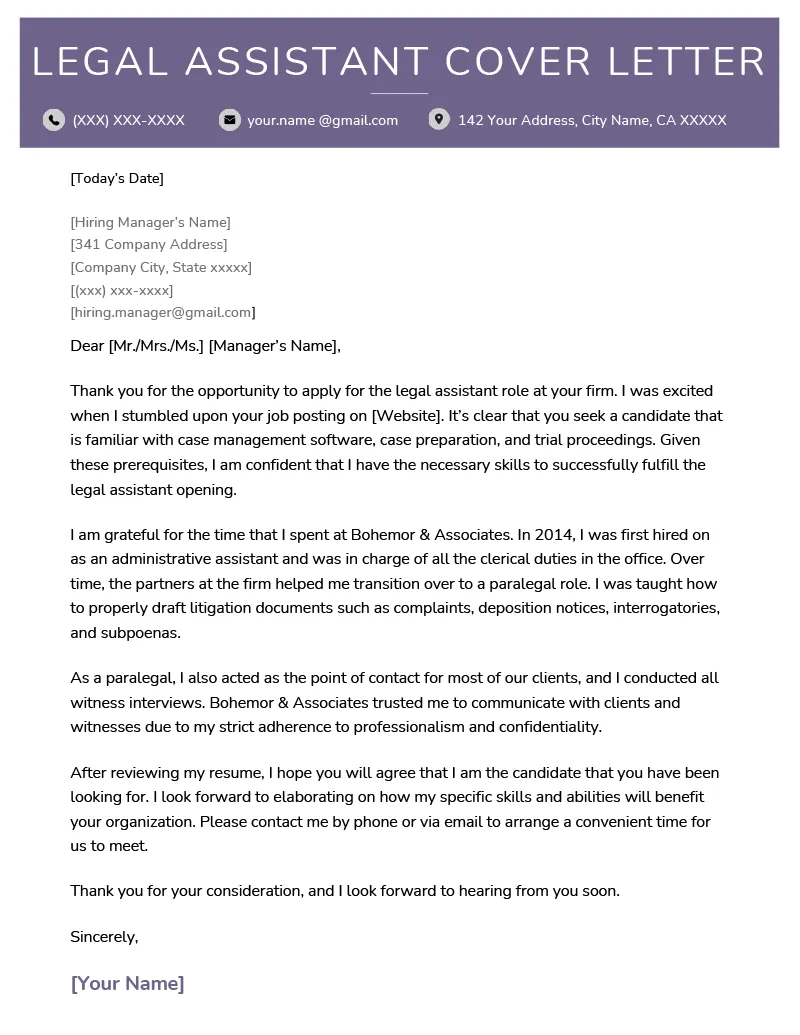
Proofreading and formatting are critical steps in writing a law firm cover letter. Errors in grammar, spelling, and punctuation can undermine your credibility and make you appear careless. Carefully proofread your letter multiple times. Ask a friend, family member, or career advisor to review your letter for any mistakes you may have missed. Pay close attention to formatting. Use a professional and readable font, such as Times New Roman or Arial. Ensure that your margins are consistent and the spacing is appropriate. Formatting mistakes, like grammatical errors, detract from your professionalism. Review your work at least twice before submitting the letter. Ensure that you are following the required format, whether this involves a specific template or another aspect of the application process.
Reviewing Law Firm Cover Letter Examples
Studying examples of successful law firm cover letters can provide valuable insights. Look for examples that are tailored to specific practice areas or firms. Analyze the structure, content, and tone of these letters. Note how the candidates highlight their skills and experiences. Identify the common elements and best practices used in these successful cover letters. By studying different examples, you can gain a better understanding of what hiring managers look for and how to present your qualifications effectively. Various online resources and career websites provide examples of law firm cover letters. Use the examples as a guide, but do not plagiarize. Adapt the examples to your personal situation, including your skills, and experience.
Analyzing Successful Cover Letters
When analyzing successful cover letters, pay attention to how the writer demonstrates their interest in the firm. Note the language used to highlight specific skills and experiences, as well as how quantifiable achievements are presented. Look for a clear and concise writing style. Identify how the writer tailors their letter to the specific firm and position. Assess the overall tone and whether it reflects professionalism and enthusiasm. Notice how the letter addresses any gaps in the applicant’s background. By breaking down successful cover letters, you will learn how to craft your own. Use these insights to inform your writing and improve the impact of your cover letter.
Learning from Common Mistakes
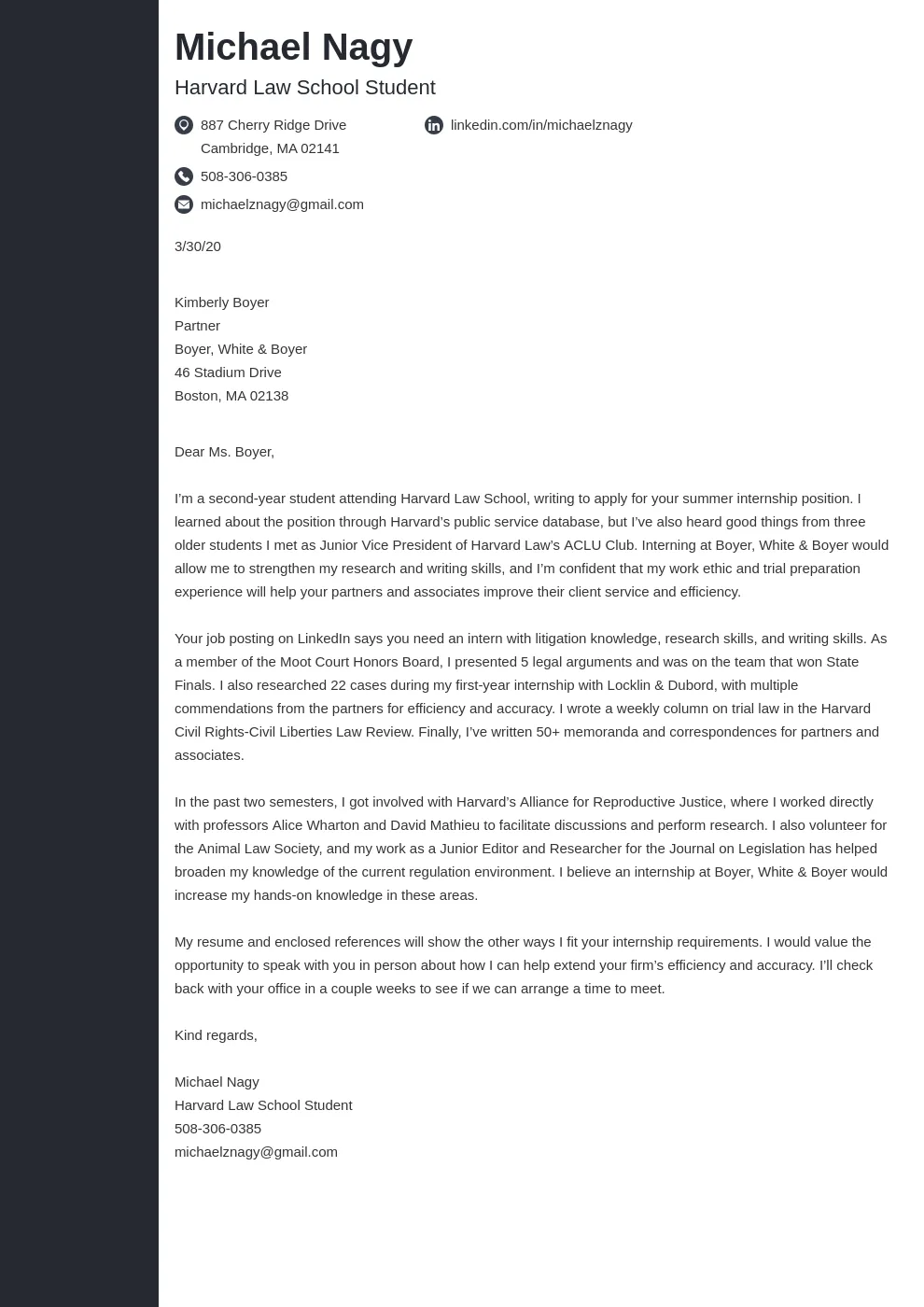
Avoid common mistakes. These include generic language, typos, excessive length, and a lack of personalization. Avoid using jargon or overly complex language. Do not submit a letter that is poorly formatted or contains errors. Make sure that your resume and cover letter work well together. Ensure you’ve provided enough detail about your background. Be sure that the content aligns with the job description. Avoid negative language or criticizing previous employers. By learning from common mistakes, you can improve your cover letter and increase your chances of success.
Submitting Your Cover Letter Effectively
Follow the instructions provided by the law firm when submitting your cover letter and resume. If the firm has specific requirements, adhere to them exactly. When submitting electronically, use a professional file name and format, such as your name and the document type (e.g., “JohnDoe_CoverLetter.pdf”). Ensure that your cover letter is formatted correctly and easy to read. Proofread your submission carefully before sending it. Sending your cover letter in the right format improves the chances that it will be read by the hiring manager. Sending it in the wrong format can result in an immediate rejection. Always ensure that your cover letter meets all of the requirements outlined in the job description.
